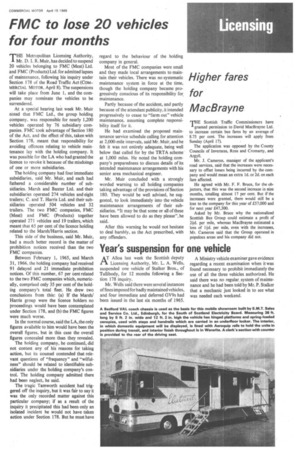FMC to lose 20 vehicles for four months
Page 45

If you've noticed an error in this article please click here to report it so we can fix it.
THE Metropolitan Licensing Authority, Mr. D. I. R. Muir, has decided to suspend 20 vehicles belonging to FMC (Meat) Ltd. and FMC (Products)Ltd. for admitted lapses of maintenance, following his inquiry under Section 178 of the Road Traffic Act (COMMERCIAL MOTOR, April 8). The suspensions will take place from June 1, and the companies may nominate the vehicles to be surrendered.
At a special hearing last week Mr. Muir noted that FMC Ltd., the group holding company, was responsible for nearly 1,200 vehicles operated by 76 subsidiary companies. FMC took advantage of Section 180 of the Act, and the effect of this, taken with Section 178, meant that responsibility for avoiding offences relating to vehicle maintenance lay with the holding company. It was possible for the LA who had granted the licence to revoke it because of the misdoings of one or more subsidiaries.
The holding company had four immediate subsidiaries, said Mr. Muir, and each had fathered a considerable number of subsidiaries. Marsh and Baxter Ltd. and their subsidiaries operated 274 vehicles and eight trailers; C. and T. Harris Ltd. and their subsidiaries operated 504 vehicles and 32 trailers. The two FMC companies, FMC (Meat) and FMC (Products) together operated 27i vehicles and 19 trailers, which meant that 65 per cent of the licence holding related to the Marsh/Harris section.
This side of the business, said Mr. Muir, had a much better record in the matter of prohibition notices received than the two FMC companies.
Between February 1, 1965, and March 31, 1966, the holding company had received 91 delayed and 21 immediate prohibition notices. Of this number, 67 per bent related to the two FMC companies which, numerically, comprised only 35 per cent of the holding company's total fleet. He drew two conclusions from this: (a) If the Marsh/ Harris group were the licence holders no proceedings would have been contemplated under Section 178, and (b) the FMC figures were much worse.
In the normal course, said the LA, the only figures available to him would have been the overall figures, but in this case the overall figures concealed more than they revealed.
The holding company, he continued, did not contest any of his reasons for taking action, but its counsel contended that relevant questions of "frequency" and "wilfulness" should be related to identifiable subsidiaries under the holding company's control. The holding company admitted there had been neglect, he said.
The tragic Tamworth accident had triggered off the inquiry, but it was fair to say it was the only recorded matter against this particular company; if as a result of the inquiry it precipitated this had been only an isolated incident he would not have taken action under Section 178. But he must have regard to the behaviour of the holding company in general.
Most of the FMC companies were small and they made local arrangements to maintain their vehicles. There was no systematic maintenance system in force at the time, though the holding company became progressively conscious of its responsibility for Maintenance.
Partly because of the accident, and partly because of the attendant publicity, it intended progressively to cease to "farm out" vehicle maintenance, assuming complete responsibility itself for it.
He had examined the proposed maintenance service schedule calling for attention at 2,000-mile intervals, said Mr. Muir, and he felt it was not entirely adequate, being well below that called for by the TRTA scheme at 1,000 miles. He noted the holding company's preparedness to discuss details of its intended maintenance arrangements with his senior area mechanical engineer.
Mr. Muir concluded with a strongly worded warning to all holding companies taking advantage of the provisions of Section 180. They would be well advised, he suggested, to look immediately into the vehicle maintenance arrangements of their subsidiaries. "It may be that some or all of these have been allowed to do as they please", he said.
After this warning he would not hesitate to deal harshly, as the Act prescribed, with any offenders.








































































































































